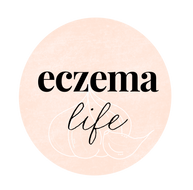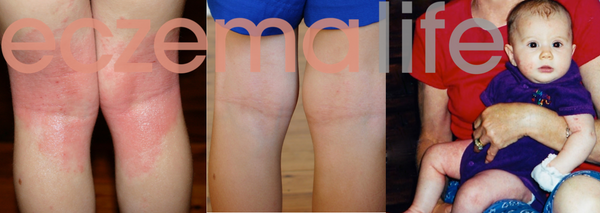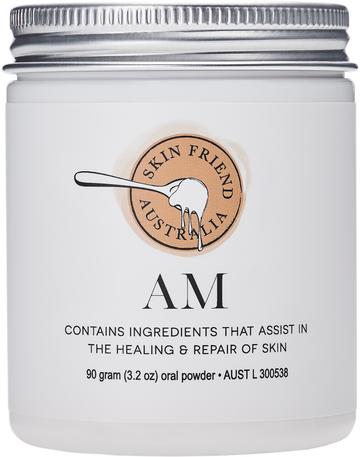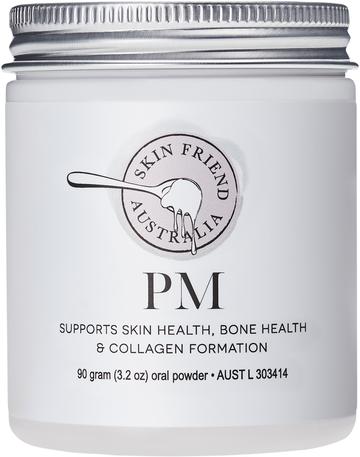What are the ingredients in Skin Friend?

Skin Friend was initially developed for Ayva my two-year-old daughter who suffered from eczema. If you have read The Eczema Diet book you probably already know about Ayva's eczema journey. But if you haven't here is a quick recap, as Ayva is the reason the Skin Friend supplements exist.
Ayva developed eczema when she was only two weeks old. By the time she was one she was diagnosed with salicylate sensitivity. Salicylates (pronounced suh-lis-a-lates) are a group of chemicals found in many fruits and vegetables, sauces, aspirin and baby teething gels to name a few.
Since I had previously suffered with salicylate and chemical sensitivity I knew how to reverse the problem with nutrients so I had hoped to give Ayva vitamin and mineral supplements that were readily available in stores. However, I could not find supplements that were free of fruit flavouring, herbs and other salicylate-rich (chemical-rich) ingredients that made her skin itch like crazy.
No one catered to people who were sensitive to chemicals. I was frustrated so I formulated my own salicylate-free, low allergy products. Using Skin Friend and The Eczema Diet, Ayva's skin soon cleared up. I have published her photos, below.
I actually did not expect her skin to clear up so quickly, so I did not take photos of her legs when they were at their most severe (once they began to clear up I thought I had better take a photo!).
About Skin Friend AM
The Skin Friend AM product was first developed over 14 years ago (initially for Ayva and for myself as I had psoriasis). However, I did not feel right selling it until it had been tested and until I had gathered valuable feedback.
Prior to officially launching the product in 2016, hundreds of patients at my eczema clinic in Sydney had tried the product first-hand. And I refined and tweaked the formula until I was happy with the results. I have been free of psoriasis (and hand dermatitis) for many years now. The past decade has been a labour of love. It really feels like Skin Friend is my third child and I’m a proud mother!
'Is Skin Friend non-GMO and vegan-friendly?'
Skin Friend AM and PM are 100% vegan, animal cruelty-free, gluten-free, hexane-free and 100% free of GMO ingredients. We have people emailing us asking if our vitamin C is non GMO - yes the whole product is 100% non-GMO and this is stated on our label.
If you are currently taking supplements check the label to see if it's 'non-GMO' and soy-free - you will be surprised how many popular supplements contain hidden GMO ingredients, soy, hexane and other potential irritants.
The top 8 vitamins & minerals for eczema
Molybdenum
Preservatives such as sulphites trigger or worsen eczema in more than 50% of eczema sufferers according to researchers from the RPA Hospital Allergy Unit in Sydney. Molybdenum is an essential part of preventing and reversing sulphite sensitivity and skin rashes as it helps your liver break down sulphites.
Low dose B vitamins
Biotin, vitamin B2 and vitamin B6 help to prevent basic nutritional deficiencies which can cause eczema and dermatitis. However, as B vitamins are acidic, they can worsen eczema when taken in high doses. So Skin Friend AM contains RDI amounts of B vitamins in the right ratios to prevent B vitamin deficiencies. Not too much and not too little! That way, your skin gets what it needs to repair each day. The B vitamins are teamed with alkaline minerals so the supplement is alkaline, not acidic.
Vitamin B6 is essential for healthy skin and a normal functioning immune system. It helps the liver detoxify chemicals and it can reduce the toxic effects of salicylates, benzoic acids, food preservatives, monosodium glutamate (MSG), alcohol and heavy metals.
Vitamin B6 is wonderful for eczema but you need to take it with other B vitamins, vitamin C and skin-repairing minerals for a visible beneficial effect.
Vitamin C (ascorbic acid)
Vitamin C (also known as ascorbic acid) is vital for the formation of collagen in the skin and it is necessary for wound healing.
Vitamin C and vitamin B6 are also natural antihistamines. Yes, like the antihistamines you buy at the drugstore for treating hay fever or eczema, except vitamin C and B6 are better as they increase DAO levels in your body (Maintz 2007).
Researchers found that ascorbic acid (a pure form of vitamin C) increases DAO, the enzyme that destroys the imidazole ring of the histamine molecule. This is important as you want to reduce histamines in the body (by increasing DAO) as histamines cause the unpleasant side-effects felt when you have an allergic reaction such as hay fever or itching.
Vitamin C deficiency can result in histamine toxicity and as a consequence allergic reactions may increase in severity. If you have allergies and eczema it’s essential to take vitamin C and vitamin B6.
Antihistamine drugs - better or worse?
Interestingly, antihistamine drugs do not increase your body's DAO supply, so they do not fix the problem. This is why their positive effects soon wear off. In fact, antihistamine drugs can make you feel worse in the long run. According to the United States National Library of Medicine, antihistamine drugs can cause constipation and frequent use of antihistamine drugs can cause liver injury.
This is bad news, as bad liver function equals bad eczema.
This could be why eczema worsens after years of using medical drugs, because an unhealthy liver equals unhealthy skin. Your liver is the chemical processing plant so if it's not working well, food allergies and intolerances are the result, then your immune system goes into overdrive every time you are exposed to an allergen. Rather than use antihistamines and other drugs for eczema, the goal is to make your body healthy and stronger (not weaker) so your skin naturally clears up.
That is why I love ascorbic acid and vitamin B6 – they are good for your liver and your body as a whole, if taken in the right doses (i.e. not too much).
"Does cherry juice which is rich in vitamin C have the same effect?"
I had a reader email us last week asking about cherry juice (as an alternative to ascorbic acid). So I wanted to print my reply here for everyone: Skin Friend AM does not contain fruit sources of vitamin C (such as cherry juice) as many fruits are rich in itch-promoting salicylates. Cherry juice and other fruit extracts can make eczema itchier, and there is no evidence that cherry juice enhances DAO activity. Most of the scientific research on the benefits of vitamin C use ascorbic acid, so we have used the most researched form of vitamin C so we can ensure the potency of our product.
Magnesium
Magnesium can decrease food chemical intolerances when combined with calcium carbonate and vitamin B6. Magnesium can help to reduce skin inflammation such as contact dermatitis (Greiner 1990).
Zinc
While zinc alone will not cure eczema, zinc is vital for skin wound healing and skin maintenance. It inhibits histamine release so it can also help to reverse histamine intolerance, and reduce some allergic reactions, along with vitamin B6 and vitamin C (Marone, 1986 and 1981).
We used zinc gluconate in Skin Friend AM as research shows it has significant beneficial effects for treating inflammation, acne, the skin disease Hidradenitis suppurativa, and the common cold (Dreno 1989; Eby 1984 Brocard 2007).
We have ensured our vitamins and minerals are free of hidden preservatives and salicylates - this meant avoiding herbs, honey, tea extracts and fruit flavourings, in favour of the healing benefits of pure vitamins and minerals.
More info about Skin Friend
If you would like more infomation about Skin Friend, feel free to email us via our contact page (see left bar). We are happy to assist and we reply to all inquiries usually within a couple of days. Note we sometimes receive hundreds of emails each week so on occasion responses may take longer.
Also refer to our allergy information here >>
Read about Skin Friend PM here >>
Note we offer ongoing support via our Facebook Eczema Diet Support Group which we recommend you join while following the Eczema Diet/Skin Friend program.
Products
At Eczema Life, we recommend nutritionist Karen Fischer's low food chemical program (The Eczema Detox) along with additive-free supplements for skin health and wellbeing. Click on the images to view more details:
References
Cabrini, L., Bergami, R., Fiorentini, D., Marchetti, M., Landi, L. and Tolomelli, B., 1998. Vitamin B6 deficiency affects antioxidant defences in rat liver and heart. IUBMB Life, 46(4), pp.689-697.
Maintz, L. and Novak, N., 2007, ‘Histamine and histamine intolerance’, American Journal of Clinical Nutrition, vol. 85, no. 5, pp. 1185–96.
Sydenstricker, V.P., et al., 1942, ‘Observations on the ‘egg white injury’ in man and its cure with a biotin concentrate’, Journal of the American Medical Association, vol. 118, no. 14, pp. 1199–200.
Marone, G., et.al., 1986. Physiological concentrations of zinc inhibit the release of histamine from human basophils and lung mast cells. Agents and actions,18(1-2), pp.103-106.
Papaioannou, R. and Pfeiffer, C.C., 1984. Sulfite sensitivity-unrecognized threat: is molybdenum deficiency the cause?. Journal of orthomolecular psychiatry, 13(2), pp.105-110.
Abumrad, N.N., 1984. ‘Molybdenum--is it an essential trace metal?’ Bulletin of the New York Academy of Medicine, 60(2), p.163.
Maggini, Silvia, et al. "Selected vitamins and trace elements support immune function by strengthening epithelial barriers and cellular and humoral immune responses." British Journal of Nutrition 98.S1 (2007): S29-S35.
Johnston CS. 1996, The antihistamine action of ascorbic acid. Subcell Biochemistry, Vol. 25, pp 189-213.
Maintz, L. and Novak, N., 2007. Histamine and histamine intolerance. The American journal of clinical nutrition, 85(5), pp.1185-1196.
Greiner, J. and Diezel, W., 1990. Inflammation-inhibiting effect of magnesium ions in contact eczema reactions. Der Hautarzt; Zeitschrift fur Dermatologie, Venerologie, und verwandte Gebiete, 41(11), pp.602-605.
Marone, G.I.A.N.N.I., Findlay, S.R. and Lichtenstein, L.M., 1981. Modulation of histamine release from human basophils in vitro by physiological concentrations of zinc. Journal of Pharmacology and Experimental Therapeutics, 217(2), pp.292-298.
Marone, G., Columbo, M., De Paulis, A., Cirillo, R., Giugliano, R. and Condorelli, M., 1986. Physiological concentrations of zinc inhibit the release of histamine from human basophils and lung mast cells. Inflammation Research, 18(1), pp.103-106.
Eby, G.A., Davis, D.R. and Halcomb, W.W., 1984. Reduction in duration of common colds by zinc gluconate lozenges in a double-blind study. Antimicrobial agents and chemotherapy, 25(1), pp.20-24.
Dreno, B., Amblard, P., Agache, P., Sirot, S. and Litoux, P., 1989. Low doses of zinc gluconate for inflammatory acne. Acta Derm Venereol, 69(6), pp.541-3.
MEYNADIER, J., 2000. Efficacy and safety study of two zinc gluconate regimens in the treatment of inflammatory acne. European Journal of dermatology, 10(4), pp.269-73.
Brocard, A., Knol, A.C., Khammari, A. and Dréno, B., 2007. Hidradenitis suppurativa and zinc: a new therapeutic approach. Dermatology, 214(4), pp.325-327.





